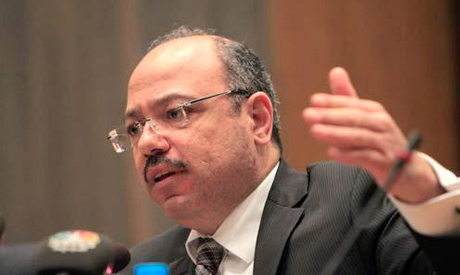
Minister of Finance Hany Kadry Dimian (Al-Ahram)
Egypt lowered its economic growth forecast to a range of 4 to 4.25 percent for the current fiscal year ending on 30 June, down from 5 percent, Finance Minister Hany Kadry Dimian told reporters at an economic conference in Abu Dhabi, according to Bloomberg.
The downward revision for growth was attributed to the consequences of the downing of a Russian plane in October on tourism, a vital source of foreign currency.
Egypt's economic growth for the first quarter of the current fiscal year slowed to 3 percent, down from 5.6 percent in the same period a year earlier, a recent central bank bulletin revealed.
“Tourism is one of the major sectors, not just as a driver of growth and one of the biggest sources of current-account receipts but because it has a higher multiplier impact on other industries, Dimian was quoted as saying by Bloomberg.
Company operations in Egypt have been restrained by a foreign currency crunch as sporadic violence and attacks following the 2011 uprising have driven away tourists and investors.
Dimian added that the lower growth rates contribute to a higher budget deficit target, seen now at 11 to 11.5 percent of GDP, up from 8.9 percent.
Egypt has depended on Gulf states, who have showered the country with billions of dollars since the ouster of Muslim Brotherhood president Mohamed Morsi on the back of popular protests against his rule, to limit its ballooning budget deficit.
While they still give Egypt credit facilities for oil products, “what we are focusing on now is how to foster direct investments from the Gulf states,” Dimian was cited as saying by Bloomberg.
The Saudi Public Investment Fund pledged in December investments worth 30 billion riyals ($8 billion) for the country's housing, energy and tourism sectors.
The finance minister said the government plans to proceed with the economic reform programme, reform the state budget and tackle the foreign currency shortage.
Egypt cut fuel subsidies in July 2014, raising prices at the pump by up to 78 percent. A property tax was also introduced as part of a fiscal reform programme seeking to clench on to a growing budget deficit which hit 11.5 percent in 2014/15.
The implementation of a stalled value-added tax awaits parliamentary approval, he said.
The central bank has raised a foreign currency deposit cap for some importers, excluded manufacturing input from import restrictions and allocated EGP 5 billion ($647 million) to lenders for small and medium enterprise in an effort to boost growth.
Short link: